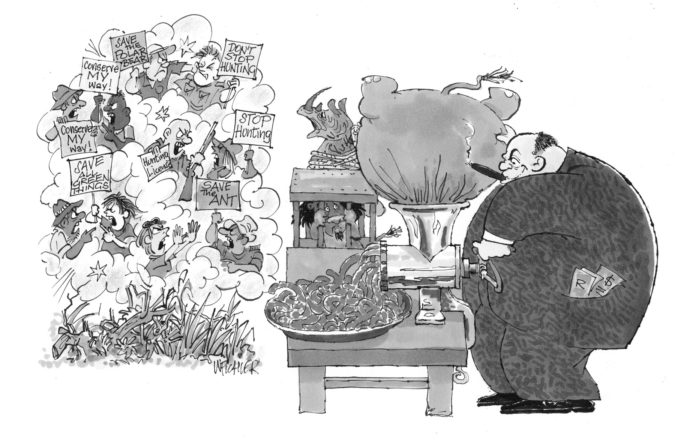Free-roaming wildlife populations are crashing in many areas, and natural habitat is being destroyed at an alarming rate. There is a conservation war going on, and the other side is winning hands down – why is that?
For the sake of simplicity, I refer to the two sides in this war as the ‘Exploiters’ and the ‘Protectors’. I do generalise enormously, please bear with me.

The Exploiters have money, lots of it. They also have focus and the determination to do whatever it takes to achieve their goals – they will ruin entire ecosystems and communities in pursuit of a specific hardwood or mineral and kill animals in the most barbaric way to extract specific body parts. They will threaten, terrify and kill people and bribe whoever it takes. They research, plan and execute their extraction strategies with military precision and their leaders live in financial and legal twilight zones, protected by a ring of violence, corruption and morally bankrupt government officials, bankers, accountants and lawyers. They have hoovered up vast swathes of Earth’s bounty and they will continue to do so until there is nothing left.
Some of them live amongst you, although you may not recognise them in this light. Perhaps they are not involved in poaching (as you define it), or other obvious illegal exploitations, and so you don’t see them as exploiters. Perhaps they wear suits, and work in respected companies and governments. Extraction industries such as mining, commercial fishing, hardwood logging and fossil fuel energy provide products that humans need, but many of them do so at massive cost to the environment – and leave taxpayers and rural communities to carry the cost. Great business model – bank the revenue and leave others to pay the bills.
The Protectors, on the other hand, are largely a ragtag, passionate bunch of do-gooders (myself included) all beavering away in various ways, driven by the strong belief that somehow, sometime, things will change.
Protectors are ALWAYS under-resourced. Try securing funding from banks, investment companies and the wealthy elite to save a species or wetland. On the other hand, go to the same places to fund a diamond mine or oil refinery – no problem. Why is that? In solving this riddle, perhaps you will come to better understand why we are in this mess and why the Exploiters are winning. Hands down.
Protectors often spend a good deal of time, energy and money passionately fighting each other in a glorious orgy of personal agendas. Social media has ramped up this phenomenon, providing a fertile breeding ground for Protectors to shout the odds, bicker and jockey for attention. Amongst the many committed and effective activists out there are a growing number of self-proclaimed online activists, some of whom extract precious donations to fund their lifestyles, many of whom have no clear strategy other than to pay their bills and feed their egos. At best these warriors preach to their close circle of disciples, at worst they confuse Joe Public with their emotional outbursts, and desensitize good people about the real conservation issues.
Some Protectors have organised themselves into groups and institutions – WWF, Conservation International and Greenpeace for example. Many of these do fine jobs, many on limited budgets, and are staffed by outstanding people – others have become bloated bureaucracies with high overheads. And again, these wildlife warriors fight tooth and nail for attention and funding, to feed personal careers and pay the overheads. And then there is CITES. For some reason, many Protectors don’t realise that CITES is an agreement between governments, politicians and businessmen about how much of nature can be consumed without completely destroying it. In other words, CITES represents the Exploiters, not the Protectors.
I could go on and on trying to summarise the chaotic world that is nature conservation. But I won’t. The industry is too wrapped up in personal agendas, lifestyle activists and destructive territorialism to ever be understood fully.
And therein lies the problem – Protectors operate in an underfunded environment with no industry cohesion or business model to speak of, driven largely by passion and dogged by infighting and personal agendas. Compare that to the focussed, ruthless Exploiter business model. In my experience, ruthless strategy trumps misguided passion hands down. And while Protectors run in circles, the Exploiters continue the massacre – all the time operating in the shadows, perfecting their extraction techniques and hoovering up the spoils.
To comment on this story: Login (or sign up) to our app here - it's a troll-free safe place 🙂.![]()






